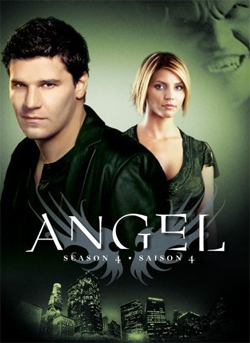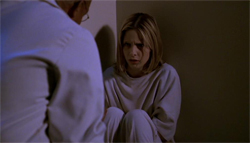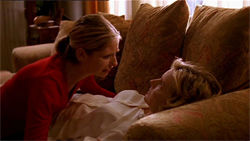 By Wednesday evening, there’s little on network television that’s of interest to me, so instead of watching the implausible Criminal Minds or the tired CSI, I turned to my TV on DVD shelf and started alphabetically.
By Wednesday evening, there’s little on network television that’s of interest to me, so instead of watching the implausible Criminal Minds or the tired CSI, I turned to my TV on DVD shelf and started alphabetically.
When Angel debuted in the fall 1999 I was skeptical. Certainly, the character had run its course on Buffy The Vampire Slayer, but I never thought David Boreanaz was all that great an actor or could carry his own show.
I was pleasantly surprised; in fact, I thought Angel’s first season was stronger than the concurrent fourth season of Buffy. Season two was also really strong and while season three started out rather well, it’s weaker than its predecessors for some of the same reasons that make Angel’s penultimate season the most disappointing, despite being ambitious.
Angel’s fourth season starts out promising, picking up several months after the third season ended, with Cordelia now a higher being and Angel locked in a box at the bottom of the ocean. With Lorne now in Vegas performing, Fred and Gunn hold the fort while keeping an eye on Angel’s son Connor. The season premiere is a solid start to the year, resolving cliff hangers and most importantly to me, kick-starting Wesley’s gradual return to the group. The next few episodes are all entertaining as standalone episodes too, while moving the year’s big arc along at the same time and giving each of our main characters their own stories.
But then we hit the seventh episode of season four, “Apocalypse, Nowish”, and that’s when things start to fall apart:
It’s all arc: From here on in, every episode is tied to this year’s big storyline, with the debut of the Beast, the revelation that Cordelia is not what she seems, and her subsequent pregnancy. The only real exception is episode 16 with the final onscreen appearance of Gwen Raiden, who enlists Gunn’s help on one of her heists.
It’s all dark: Angel is a dark series and the drama is based on our heroes enduring horrible ordeals, but the usual Whedonesque humor seems absent here and the one-liners that are written in to undercut the drama are weak for the most part.
Cordelia isn’t Cordelia: I didn’t think having Charisma Carpenter’s character move to Angel was a great idea when I first heard about it, but seasons one and two proved me wrong, and up until season three’s “Birthday” I was pleasantly surprised and enjoyed her journey from selfish and shallow to hard-edged hero. But from there on in, it was apparent that the writers didn’t know what to do with her and season four essentially invalidates her journey into nothing more than a manipulation by unseen forces, which I think is insulting to the character and her fans. Cordelia spends the last five episodes of the season unconscious. It’s not until season five that we see a proper send off for Carpenter’s character.
It drags: The middle of the season is slow and full of filler. The scenes between Cordelia and Connor are tedious for the most part. I found myself fast-forwarding through a lot of episodes.
The return of Angelus: It was inevitable that Angel’s evil alter-ego would return and wreak havoc. Aside from flashbacks, he’s not been seen since season two of Buffy. However, the reasons for bringing him back are weak story-wise and for the most part, the episodes are rather dull until his showdown with Faith.
Connor: The problem with this character from the beginning is that he’s not really a character so much as a plot device (you could make the same argument for Dawn on Buffy). His birth and presence on the series as a baby slowed down season three. The biggest problem with Connor is that he’s not very bright, which sticks out like a sore thumb because characters in the Angel / Buffy universe all tend to be reasonably intelligent in their own way, even when they’re evil, such as the lawyers at Wolfram & Hart. Yes, Holtz had nearly 20 years to make Connor hate Angel and as a hormonal 18-year-old it makes sense that he might fall for Cordelia, but considering he was raised in a hell dimension, you’d think he be a little more cunning and not just a great fighter. He hates his father because he perceives Angel as evil, but by the end of the season he’s complicit in the deaths of many innocent people, whether it’s the virgin sacrificed by evil Cordy or the folks on Jasmine’s dinner plate. Speaking of which…
Jasmine: It’s not that the Jasmine storyline doesn’t work, but it also drags, and I’ve always got the feeling that it was tacked on because the original Big Bad storyline wasn’t long enough. The pace of the series does pick up again once she arrives but by this point the whole year has become rather tiring.
This my fourth full re-watch of the series since it was first run. When it aired, I defended Connor and various storylines to friends who were losing interest in the series, but this latest viewing made it impossible to ignore the faults in Angel’s fourth season.
It wasn’t all bad, however. The return of Faith was welcome. She fits in better with the greyness of the Angel universe compared to the black and white, good or evil world of Buffy. Seeing her paired with the now battle-hardened Wesley was a treat, considering their history together, and her final appearance in “Orpheus” was one the best episodes of the series. Meanwhile, Wesley is the most compelling character in the Buffy-verse. It’s hard to believe he wasn’t supposed to live very long after he was first introduced. Many of the non-arc episodes early in the year are well-paced and plotted and there are some good episodes following the debut of the Beast.
When Angel (and Buffy) really work well as a TV series, however, is when each episode stands by itself as a story, whether it’s part of a big arc or not. In this regard, season four of Angel fails and is the victim of its own ambition.
Gary Hilson is a writer, editor and digital media specialist for hire. He lives in Toronto.
 Buffy the Vampire Slayer is a lot more complex than the title of the show suggests, and after six years, the heroine of this series has collected a lot of baggage, emotional and otherwise.
Buffy the Vampire Slayer is a lot more complex than the title of the show suggests, and after six years, the heroine of this series has collected a lot of baggage, emotional and otherwise. It’s been several weeks since “The Body” aired, and I’m still trying to digest the viewing experience. Suffice it to say, if this brilliant hour of television doesn’t earn Buffy The Vampire Slayer an Emmy nod, I don’t know what will.
It’s been several weeks since “The Body” aired, and I’m still trying to digest the viewing experience. Suffice it to say, if this brilliant hour of television doesn’t earn Buffy The Vampire Slayer an Emmy nod, I don’t know what will.